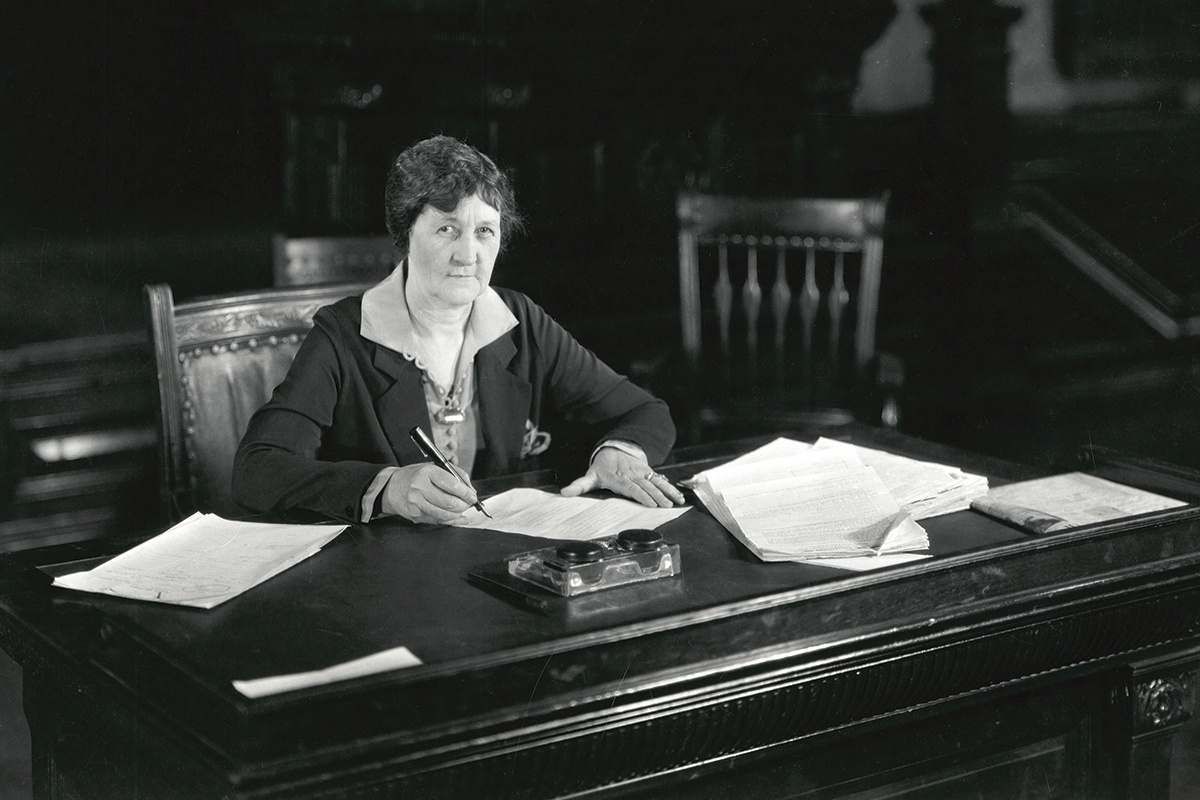Texas’ first female governor, Miriam “Ma” Ferguson, rode into office in 1925 on the coattails of her husband, former Gov. Jim Ferguson, who had been impeached by the state Senate in 1917.
Impeachment made him “ineligible to hold any office of honor, trust or profit under the state of Texas.” To Jim Ferguson, this edict was a serious inconvenience. He had unfinished business, and the biggest issue was the Ku Klux Klan.
While Texans slowly adopted the cultural changes that swept the country after World War I, many embraced the Ku Klux Klan. The Klan gained a significant foothold in Texas politics during the early 1920s.
Originally formed to foster white supremacy, the Klan of the 1920s claimed to have a new focus. Along with racial purity, its leaders preached patriotism, fundamentalism and strict morality. Although the majority of Klan members came from the ranks of the poor and uneducated, a few powerful citizens joined. Voting as a bloc, the Klan elected sheriffs, district attorneys, legislators and judges as it launched acts of terrorism.
The Dallas KKK administered vigilante justice in a secluded spot along the Trinity River. One woman suspected of marrying a second time without seeking a divorce from her first husband was beaten with a wet rope, tarred and feathered, and warned to get out of town. A black elevator operator was whipped and branded on the forehead with the KKK emblem. October 23, 1923, was Ku Klux Klan Day at the State Fair of Texas, and the event drew hordes of white-robed and hooded members of the Invisible Empire. More than 5,000 new recruits took part in initiation ceremonies at the fairgrounds the next day.
In 1924, four years after women won the right to vote, Jim Ferguson announced the candidacy of his wife, Miriam Amanda, for governor of Texas. Early in the campaign, a reporter combined her initials and dubbed her “Ma.” Pitted against Klan-backed candidate Felix D. Robertson, Ma Ferguson won the support of voters who were sick of the violence and intimidation of the KKK. Although she was photographed feeding chickens and wearing a sunbonnet, Ferguson was far from the country girl Jim Ferguson described. Born in Bell County in 1875, she attended Salado College and Baylor Female College. Her campaign slogan promised “two governors for the price of one.”
George Dealey, the editor of The Dallas Morning News, said on August 17, 1924: “Miriam Ferguson’s election will sound the death knell of the Klan as a political power base in the state.”
After defeating her KKK-backed opponent, Ma Ferguson followed through on her campaign promise to pass a law forbidding anyone to participate in public activity while wearing a mask. Although the courts eventually overturned the anti-mask law, it did accomplish Ferguson’s goal.
Historian L. Patrick Hughes explains, “Klan membership dropped from a high of 97,000 in the summer of 1924 to about 18,000 at the beginning of 1926. In the summer of 1927, Gov. Dan Moody declared, ‘The Klan in Texas is as dead as the proverbial doornail.’ The Klan had, by the end of the decade, dwindled to a negligible force in Texas politics and social life.”
Everyone knew that Ferguson was a mouthpiece for her husband. In her office, two swivel chairs stood behind two desks.
Like her husband before her, Ma Ferguson’s term in office was marred by scandal. Her administration awarded Highway Department contracts to firms that advertised in the Ferguson Forum, a weekly newspaper that presented the family’s views to the public. Pardons for criminals flew from beneath her pen; she granted more than 2,000 during her first two years in office. Disgruntled law officers suspected that Jim Ferguson was getting kickbacks from the pardons.
Ma Ferguson lost the primary in 1926 but was elected again by a narrow margin in 1932. Years later, Time magazine, which referred to her as “the governess,” described Ferguson as “a college educated, devoutly religious, well-bred woman who was about as political as peach cobbler.”
——————–
Martha Deeringer, a member of Heart of Texas EC, lives near McGregor.


